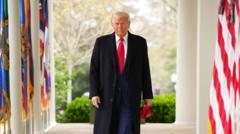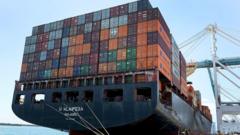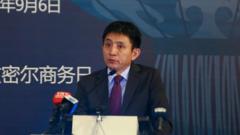Will the world succumb to Trump's trade strategy, or is there a viable path to stability?
Trump's Tariff Standoff: Economic Uncertainty Engulfs Global Markets

Trump's Tariff Standoff: Economic Uncertainty Engulfs Global Markets
As Trump's tariffs loom, nations scramble to adapt amid economic turmoil.
In a high-stakes standoff, President Donald Trump’s unprecedented "reciprocal" tariffs are set to activate, casting uncertainty over the global economy. With the deadline drawing closer, nations labeled as "worst offenders" are rushing to placate the White House before the situation escalates. In stark contrast, China has opted for a stance of defiance and retaliation, signaling its unwillingness to bow to US pressure.
Trump remains steadfast in his approach, inciting concern among some of his allies in Congress and on Wall Street regarding the sustainability of his tactics. When asked about the potential impacts on the stock market, he rebuffed the notion as a "stupid question." The burning question remains: is this a negotiation ploy or a long-term strategy aimed at transforming the global economic landscape and redefining America's global standing?
On Monday, Israeli Prime Minister Benjamin Netanyahu made headlines as the first leader to engage with Trump post-tariff announcement, promising to eliminate trade barriers and rectify Israel's surplus with the US. His assertion that Israel could set a precedent for other nations underscored the urgent need for diplomatic maneuvering among nations fearing the potential consequences of Trump’s tariffs.
Other leaders are following suit; Japan's Prime Minister Shigeru Ishiba contacted Trump, while European Commission President Ursula von der Leyen offered to mutually reduce tariffs to zero—a proposal that Trump acknowledged but deemed insufficient. However, any gestures toward compromise from China were noticeably absent, as the nation announced retaliatory tariffs, propelling Trump to threaten additional hikes on US tariffs by 50%.
As Trump's firm stance continues, investors are reacting with trepidation. A substantial drop in stock indices was observed as fears of a trade war escalated. Business leaders on Wall Street, previously supportive of Trump's policies, are now voicing opposition to the imminent tariffs. Ironically, a possible delay in these tariffs briefly surged market values before the White House quashed that hope, reiterating their commitment to the current strategy.
Trump's trade adviser Peter Navarro further galvanized skepticism about potential negotiations through his statement asserting that any offers from other nations were merely preliminary. Some speculate that the “Mar-a-Lago accord” could involve pressuring trading partners to devalue the US dollar, promoting American exports but posing substantial risks to the economy.
The White House is offering a range of conflicting narratives as they clarify Trump’s intentions behind the tariffs, raising questions about whether they are just a temporary measure or part of a larger scheme poised to reshape global trade norms. As the Wednesday deadline approaches, the world watches with bated breath, uncertain of the potential fallout from this tariff standoff.
Trump remains steadfast in his approach, inciting concern among some of his allies in Congress and on Wall Street regarding the sustainability of his tactics. When asked about the potential impacts on the stock market, he rebuffed the notion as a "stupid question." The burning question remains: is this a negotiation ploy or a long-term strategy aimed at transforming the global economic landscape and redefining America's global standing?
On Monday, Israeli Prime Minister Benjamin Netanyahu made headlines as the first leader to engage with Trump post-tariff announcement, promising to eliminate trade barriers and rectify Israel's surplus with the US. His assertion that Israel could set a precedent for other nations underscored the urgent need for diplomatic maneuvering among nations fearing the potential consequences of Trump’s tariffs.
Other leaders are following suit; Japan's Prime Minister Shigeru Ishiba contacted Trump, while European Commission President Ursula von der Leyen offered to mutually reduce tariffs to zero—a proposal that Trump acknowledged but deemed insufficient. However, any gestures toward compromise from China were noticeably absent, as the nation announced retaliatory tariffs, propelling Trump to threaten additional hikes on US tariffs by 50%.
As Trump's firm stance continues, investors are reacting with trepidation. A substantial drop in stock indices was observed as fears of a trade war escalated. Business leaders on Wall Street, previously supportive of Trump's policies, are now voicing opposition to the imminent tariffs. Ironically, a possible delay in these tariffs briefly surged market values before the White House quashed that hope, reiterating their commitment to the current strategy.
Trump's trade adviser Peter Navarro further galvanized skepticism about potential negotiations through his statement asserting that any offers from other nations were merely preliminary. Some speculate that the “Mar-a-Lago accord” could involve pressuring trading partners to devalue the US dollar, promoting American exports but posing substantial risks to the economy.
The White House is offering a range of conflicting narratives as they clarify Trump’s intentions behind the tariffs, raising questions about whether they are just a temporary measure or part of a larger scheme poised to reshape global trade norms. As the Wednesday deadline approaches, the world watches with bated breath, uncertain of the potential fallout from this tariff standoff.























